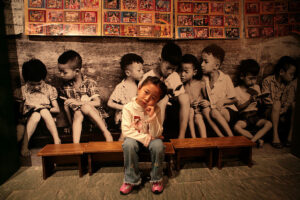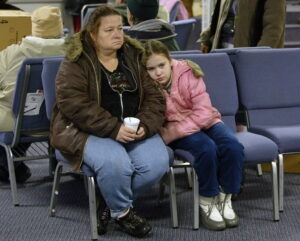Experts
News
- Policies Affecting Families: What we know, and what to expect in the second Trump term
 In a new symposium, CCF brings together leading experts to discuss how immigration, abortion, student debt, and LGBTQIA+ related policies affect families.
In a new symposium, CCF brings together leading experts to discuss how immigration, abortion, student debt, and LGBTQIA+ related policies affect families. - Increases in Community Income Improve Birth Outcomes
 In a new brief report, Dr. Molly Martin explores how economic development and other policies that increase community income can reduce incidence of low birth weight
In a new brief report, Dr. Molly Martin explores how economic development and other policies that increase community income can reduce incidence of low birth weight - U.S. parents financially support their adult children. But in immigrant families, it’s the reverse.
 Brief report from CCF Early Career Scholar Dr. Vanessa Delgado shows that parental immigration status shapes adult children’s decisions to “give back” in immigrant families.
Brief report from CCF Early Career Scholar Dr. Vanessa Delgado shows that parental immigration status shapes adult children’s decisions to “give back” in immigrant families. - Leave Laws Support EquityA briefing paper prepared by Jeff Hayes, Women’s Bureau, U.S. Department of Labor[1], and H. Elizabeth Peters, Urban Institute, for the Council on Contemporary Families symposium The COVID-19 Pandemic and the Future of Gender Equality… Read more: Leave Laws Support Equity
- Mothers Continue to Experience Career Consequences Three Years into the PandemicA briefing paper prepared by Jill E. Yavorsky, University of North Carolina Charlotte, Yue Qian, University of British Columbia, and Liana Christin Landivar, Women’s Bureau, U.S. Department of Labor, for the Council on Contemporary Families… Read more: Mothers Continue to Experience Career Consequences Three Years into the Pandemic
- Childcare Challenges During the Pandemic and Their Impact on Parents and Care ProvidersA briefing paper prepared by Liana Christin Landivar, Women’s Bureau, U.S. Department of Labor, and Pilar Gonalons-Pons, University of Pennsylvania for the Council on Contemporary Families online symposium The COVID-19 Pandemic and the Future of… Read more: Childcare Challenges During the Pandemic and Their Impact on Parents and Care Providers
- Executive Summary: The COVID-19 Pandemic and the Future of Gender EqualityPrepared by Daniel L. Carlson, University of Utah, and Richard J. Petts, Ball State University, for the Council on Contemporary Families symposium The COVID-19 Pandemic and the Future of Gender Equality (PDF). The COVID-19 pandemic… Read more: Executive Summary: The COVID-19 Pandemic and the Future of Gender Equality
- The COVID-19 Pandemic and the Future of Gender Equality Symposium
 A new CCF symposium highlights what emerging research tells us about changes to family & work life during the COVID-19 pandemic and what they mean for the future of gender equality in the U.S.
A new CCF symposium highlights what emerging research tells us about changes to family & work life during the COVID-19 pandemic and what they mean for the future of gender equality in the U.S. - Best for Whom? Breastfeeding and Child Development
 In a new brief report from CCF, Jessica Su finds that breastfeeding benefits are modest, and reach some children more than others
In a new brief report from CCF, Jessica Su finds that breastfeeding benefits are modest, and reach some children more than others - NEW FROM CCF! No More in the Shadows: Racism, Family Structure, and Black Families
 Family formation has long been touted as a source of racial inequality, but what does the research actually say?
Family formation has long been touted as a source of racial inequality, but what does the research actually say? - Mothers Are the Primary Earners in Growing Numbers of Families with Children
 A new study estimates that about 70% of U.S. moms can expect to be primary financial providers before their children turn 18.
A new study estimates that about 70% of U.S. moms can expect to be primary financial providers before their children turn 18. - Staying Ready, Staying Vigilant, Staying Safe: Hyperarousal and Hypervigilance in African American Male Adolescents Exposed to Community Violence
 A new study explores how behaviors once seen as maladaptive may actually protect youth.
A new study explores how behaviors once seen as maladaptive may actually protect youth. - CCF Experts Kuperberg and Mazelis’ Student Loan Debt Brief Report Featured on North Carolina Public Radio
 Read more here: https://www.wunc.org/2021-04-12/what-would-you-do-without-student-debt-a-study-from-unc-greensboro-put-the-question-to-recent-graduates/ Also, check out this feature in Rutgers-Camden News Now: https://news.camden.rutgers.edu/2021/04/additional-student-loan-debt-cancellations-needed-says-sociologist/
Read more here: https://www.wunc.org/2021-04-12/what-would-you-do-without-student-debt-a-study-from-unc-greensboro-put-the-question-to-recent-graduates/ Also, check out this feature in Rutgers-Camden News Now: https://news.camden.rutgers.edu/2021/04/additional-student-loan-debt-cancellations-needed-says-sociologist/ - The Difference Debt Makes: College Students and Grads on How Student Debt Affects Their Life Choices
 A new study explores the wide-ranging effects of student loan debt on young adults – and what they would do if they were forgiven.
A new study explores the wide-ranging effects of student loan debt on young adults – and what they would do if they were forgiven. - Why Families Need More Financial Support during the COVID-19 Pandemic
 Despite the important temporary relief provided to many families by the March 2020 CARES Act, millions of American families are experiencing financial hardship as we enter the new year.
Despite the important temporary relief provided to many families by the March 2020 CARES Act, millions of American families are experiencing financial hardship as we enter the new year. - Long-term Risks to Children from Economic Toll of COVID-19
 Although children appear to be less vulnerable than adults to serious COVID-19 medical complications, new data from the U.S. Census Bureau indicate that they are disproportionately endangered by the pandemic’s economic toll.
Although children appear to be less vulnerable than adults to serious COVID-19 medical complications, new data from the U.S. Census Bureau indicate that they are disproportionately endangered by the pandemic’s economic toll. - Challenges Facing Cohabiting Couples Differ from those of Married Couples in this Crisis
 A briefing paper prepared by Amanda Miller, University of Indianapolis, and Sharon Sassler, Cornell University, for the Council on Contemporary Families. Much has been written about the challenges couples face as they adjust to “shelter… Read more: Challenges Facing Cohabiting Couples Differ from those of Married Couples in this Crisis
A briefing paper prepared by Amanda Miller, University of Indianapolis, and Sharon Sassler, Cornell University, for the Council on Contemporary Families. Much has been written about the challenges couples face as they adjust to “shelter… Read more: Challenges Facing Cohabiting Couples Differ from those of Married Couples in this Crisis - When “Helicopters” Go to School: Who Gets Rescued and Who Gets Left Behind?
 When “Helicopters” Go to School: Who Gets Rescued and Who Gets Left Behind? A briefing paper prepared by Jessica McCrory Calarco, Indiana University, for the Council on Contemporary Families. We’ve all read about – and… Read more: When “Helicopters” Go to School: Who Gets Rescued and Who Gets Left Behind?
When “Helicopters” Go to School: Who Gets Rescued and Who Gets Left Behind? A briefing paper prepared by Jessica McCrory Calarco, Indiana University, for the Council on Contemporary Families. We’ve all read about – and… Read more: When “Helicopters” Go to School: Who Gets Rescued and Who Gets Left Behind? - 10 Scary Facts About Child Poverty
 October 28, 2019 A fact sheet prepared for the Council on Contemporary Families by Dr. Jennifer Glass, Executive Director, Council on Contemporary Families and Professor of Sociology, University of Texas at Austin. Believe it or… Read more: 10 Scary Facts About Child Poverty
October 28, 2019 A fact sheet prepared for the Council on Contemporary Families by Dr. Jennifer Glass, Executive Director, Council on Contemporary Families and Professor of Sociology, University of Texas at Austin. Believe it or… Read more: 10 Scary Facts About Child Poverty - Parents Can’t Go It Alone–They Never Have: What to Do for Parents to Help Our Next Generation
 Parents Can’t Go It Alone introduces you to important new work about what parents need to meet their goals and successfully raise the next generation.
Parents Can’t Go It Alone introduces you to important new work about what parents need to meet their goals and successfully raise the next generation. - New from CCF: Even Gender Inequality is Unequal
 FOR IMMEDIATE RELEASE CONTACT: Virginia Rutter / Sociology @ Framingham State University vrutter@gmail.com Sociologist Jill Yavorsky conducted a field audit on gender discrimination in hiring and shares this early exclusive summary and commentary with CCF.… Read more: New from CCF: Even Gender Inequality is Unequal
FOR IMMEDIATE RELEASE CONTACT: Virginia Rutter / Sociology @ Framingham State University vrutter@gmail.com Sociologist Jill Yavorsky conducted a field audit on gender discrimination in hiring and shares this early exclusive summary and commentary with CCF.… Read more: New from CCF: Even Gender Inequality is Unequal - Community College Students Want to Use More Effective Birth Control Methods But Can’t Always Get What They Want
 A Research Brief Prepared for the University of Texas at Austin Population Research Center Research Brief Series Download a PDF of the Brief Kristine Hopkins, Celia Hubert, Kate Coleman-Minahan, Amanda Jean Stevenson, Kari White, Daniel… Read more: Community College Students Want to Use More Effective Birth Control Methods But Can’t Always Get What They Want
A Research Brief Prepared for the University of Texas at Austin Population Research Center Research Brief Series Download a PDF of the Brief Kristine Hopkins, Celia Hubert, Kate Coleman-Minahan, Amanda Jean Stevenson, Kari White, Daniel… Read more: Community College Students Want to Use More Effective Birth Control Methods But Can’t Always Get What They Want - Is Dropping out of High School More Likely after Stressful Life Events?
 A Research Brief Prepared for the University of Texas at Austin Population Research Center Research Brief Series Veronique Dupéré, Eric Dion, Tama Leventhal, Isabelle Archambault, Robert Crosnoe, and Michel Janosz Introduction High school dropout is… Read more: Is Dropping out of High School More Likely after Stressful Life Events?
A Research Brief Prepared for the University of Texas at Austin Population Research Center Research Brief Series Veronique Dupéré, Eric Dion, Tama Leventhal, Isabelle Archambault, Robert Crosnoe, and Michel Janosz Introduction High school dropout is… Read more: Is Dropping out of High School More Likely after Stressful Life Events? - Cohabitating Couples With Lower Education Levels Marry Less. Is This Because They Do Not Want To?
 A Research Brief Prepared for the University of Texas at Austin Population Research Center Research Brief Series Download a PDF of this Brief Kelly Raley Introduction Today, nearly two-thirds of first marriages are preceded by cohabitation,… Read more: Cohabitating Couples With Lower Education Levels Marry Less. Is This Because They Do Not Want To?
A Research Brief Prepared for the University of Texas at Austin Population Research Center Research Brief Series Download a PDF of this Brief Kelly Raley Introduction Today, nearly two-thirds of first marriages are preceded by cohabitation,… Read more: Cohabitating Couples With Lower Education Levels Marry Less. Is This Because They Do Not Want To? - CCF ADVISORY: On August 26, 2017, Women’s Equality Day Turns 44
 ADVISORY: Women’s Equality Day Turns 44. Gains, stalls, and setbacks August 25, 2017, Austin, TX: Since 1973, August 26th has been designated as Women’s Equality Day, offering a chance to assess the current status… Read more: CCF ADVISORY: On August 26, 2017, Women’s Equality Day Turns 44
ADVISORY: Women’s Equality Day Turns 44. Gains, stalls, and setbacks August 25, 2017, Austin, TX: Since 1973, August 26th has been designated as Women’s Equality Day, offering a chance to assess the current status… Read more: CCF ADVISORY: On August 26, 2017, Women’s Equality Day Turns 44 - Is TANF Working for Struggling Millennial Parents?A briefing paper prepared for the Council on Contemporary Families by Shawn Fremstad, JD, Senior Fellow at the Center for American Progress and Senior Research Associate at the Center for Economic and Policy Research. The… Read more: Is TANF Working for Struggling Millennial Parents?
- It’s Women’s History Month: Why is pay for caregiving work so low relative to other jobs with similarly low requirements for formal education?
 It’s Women’s History Month: Why is pay for caregiving work so low relative to other jobs with similarly low requirements for formal education? A Briefing Paper Prepared for the Council on Contemporary Families by… Read more: It’s Women’s History Month: Why is pay for caregiving work so low relative to other jobs with similarly low requirements for formal education?
It’s Women’s History Month: Why is pay for caregiving work so low relative to other jobs with similarly low requirements for formal education? A Briefing Paper Prepared for the Council on Contemporary Families by… Read more: It’s Women’s History Month: Why is pay for caregiving work so low relative to other jobs with similarly low requirements for formal education? - Presidential Candidate Fact Checked by CCF Experts: Stephanie Coontz, Nancy Folbre, and Kristi Williams
 RH Fact Check cited CCF members Stephanie Coontz, Nancy Folbre, and Kristi Williams in its review of Jeb Bush’s comments on poverty and marriage, Hard Work and Marriage Aren’t the Magic Cure-Alls for Poverty Jeb Bush… Read more: Presidential Candidate Fact Checked by CCF Experts: Stephanie Coontz, Nancy Folbre, and Kristi Williams
RH Fact Check cited CCF members Stephanie Coontz, Nancy Folbre, and Kristi Williams in its review of Jeb Bush’s comments on poverty and marriage, Hard Work and Marriage Aren’t the Magic Cure-Alls for Poverty Jeb Bush… Read more: Presidential Candidate Fact Checked by CCF Experts: Stephanie Coontz, Nancy Folbre, and Kristi Williams - Health Care Is a Family Stressor—So There’s Good News
 September 16, 2015; The U.S. Census Bureau’s report on income, poverty and health insurance coverage, released today, reflects the continued uncertainty for U.S. families that has persisted since the Great Recession. Year-to-year changes in most… Read more: Health Care Is a Family Stressor—So There’s Good News
September 16, 2015; The U.S. Census Bureau’s report on income, poverty and health insurance coverage, released today, reflects the continued uncertainty for U.S. families that has persisted since the Great Recession. Year-to-year changes in most… Read more: Health Care Is a Family Stressor—So There’s Good News - Moynihan’s Half Century: Have We Gone to Hell in a Hand Basket?
 This briefing paper was prepared as part of an online symposium Moynihan+50: Family Structure Still not the Problem for the Council on Contemporary Families and published jointly by CCF and the Institute for Women’s Policy… Read more: Moynihan’s Half Century: Have We Gone to Hell in a Hand Basket?
This briefing paper was prepared as part of an online symposium Moynihan+50: Family Structure Still not the Problem for the Council on Contemporary Families and published jointly by CCF and the Institute for Women’s Policy… Read more: Moynihan’s Half Century: Have We Gone to Hell in a Hand Basket? - A Class Act? Stability and Instability in Children’s Lives
 Contrary to popular opinion, growing instability in American families, reflected not just in divorce rates but falling rates of marriage and high rates of unwed motherhood, is not caused by people abandoning traditional concerns for children’s well-being. It is a class issue caused by the growing gap between the job options, resources, economic stability, and personal safety nets available to college-educated Americans and less-educated workers. The authors explain.
Contrary to popular opinion, growing instability in American families, reflected not just in divorce rates but falling rates of marriage and high rates of unwed motherhood, is not caused by people abandoning traditional concerns for children’s well-being. It is a class issue caused by the growing gap between the job options, resources, economic stability, and personal safety nets available to college-educated Americans and less-educated workers. The authors explain. - Family Diversity is the New Normal for America’s Children
 People often think of social change in the lives of American children since the 1950s as a movement in one direction – from children being raised in married, male-breadwinner families to a new norm of children being raised by working mothers, many of them unmarried. Instead, we can better understand this transformation as an explosion of diversity, a fanning out from a compact center along many different pathways.
People often think of social change in the lives of American children since the 1950s as a movement in one direction – from children being raised in married, male-breadwinner families to a new norm of children being raised by working mothers, many of them unmarried. Instead, we can better understand this transformation as an explosion of diversity, a fanning out from a compact center along many different pathways. - CCF Civil Rights Symposium: Racial-Ethnic Realities since the Civil Rights Act
 Overview: Changing Racial-Ethnic Realities since the Civil Rights Act Remarks by: Stephanie Coontz Today the Council on Contemporary Families releases the second set of papers in a three part symposium marking the 50th anniversary of… Read more: CCF Civil Rights Symposium: Racial-Ethnic Realities since the Civil Rights Act
Overview: Changing Racial-Ethnic Realities since the Civil Rights Act Remarks by: Stephanie Coontz Today the Council on Contemporary Families releases the second set of papers in a three part symposium marking the 50th anniversary of… Read more: CCF Civil Rights Symposium: Racial-Ethnic Realities since the Civil Rights Act - CCF Civil Rights Symposium: Are African Americans Living the Dream 50 Years After Passage of the Civil Rights Act?
 By Velma McBride Murry and Na Liu Vanderbilt University In 1963, Rev. Dr. Martin Luther King, Jr. made his famous “I Have a Dream” speech at the March on Washington, the momentous demonstration that helped… Read more: CCF Civil Rights Symposium: Are African Americans Living the Dream 50 Years After Passage of the Civil Rights Act?
By Velma McBride Murry and Na Liu Vanderbilt University In 1963, Rev. Dr. Martin Luther King, Jr. made his famous “I Have a Dream” speech at the March on Washington, the momentous demonstration that helped… Read more: CCF Civil Rights Symposium: Are African Americans Living the Dream 50 Years After Passage of the Civil Rights Act? - CCF Civil Rights Symposium: The State of Latino Children
 By Rogelio Sáenz University of Texas at San Antonio Latinos are increasingly driving the demographic fortunes of the United States. Between 2000 and 2011, the number of white children in the country declined by 4.9… Read more: CCF Civil Rights Symposium: The State of Latino Children
By Rogelio Sáenz University of Texas at San Antonio Latinos are increasingly driving the demographic fortunes of the United States. Between 2000 and 2011, the number of white children in the country declined by 4.9… Read more: CCF Civil Rights Symposium: The State of Latino Children - Red states, blue states, and divorce: Understanding the impact of conservative protestantism on regional variation in divorce rates
 Why are divorce rates higher in religiously conservative “red” states and lower in less religiously conservative “blue” states? After all, most conservatives frown upon divorce, and religious commitment is believed to strengthen marriage, not erode it. Even so, religiously conservative states Alabama and Arkansas have the second and third highest divorce rates in the U.S., at 13 per 1000 people per year while New Jersey and Massachusetts, more liberal states, are two of the lowest at 6 and 7 per 1000 people per year.
Why are divorce rates higher in religiously conservative “red” states and lower in less religiously conservative “blue” states? After all, most conservatives frown upon divorce, and religious commitment is believed to strengthen marriage, not erode it. Even so, religiously conservative states Alabama and Arkansas have the second and third highest divorce rates in the U.S., at 13 per 1000 people per year while New Jersey and Massachusetts, more liberal states, are two of the lowest at 6 and 7 per 1000 people per year. - Was the War on Poverty a Failure? Or are Anti-Poverty Efforts Simply Swimming Against a Stronger Tide?
 This month marks the 50th anniversary of President Lyndon B. Johnson’s declaration of an “unconditional war on poverty.” Yet this month also marks over a quarter century since President Ronald Reagan’s 1988 announcement that the war on poverty was over, and that poverty had won. In this report, University of Maryland sociologist Philip Cohen examines the many early victories, as well as the setbacks in the War on Poverty.
This month marks the 50th anniversary of President Lyndon B. Johnson’s declaration of an “unconditional war on poverty.” Yet this month also marks over a quarter century since President Ronald Reagan’s 1988 announcement that the war on poverty was over, and that poverty had won. In this report, University of Maryland sociologist Philip Cohen examines the many early victories, as well as the setbacks in the War on Poverty. - Promoting marriage among single mothers: An ineffective weapon in the war on poverty?
 This month marks the 50th anniversary of President Lyndon B. Johnson’s declaration of an “unconditional war on poverty.” Yet this month also marks over a quarter century since President Ronald Reagan’s 1988 announcement that the war on poverty was over, and that poverty had won. Many politicians blame the resurgence of poverty on the spread of unwed motherhood and conclude that promoting marriage among low-income individuals would do more to reduce poverty than government investments. In this report, Ohio State University sociologist Kristi Williams examines how efforts to get impoverished single mothers to marry are unlikely to make much of a dent in poverty rates and may even have some harmful outcomes for mothers and children alike.
This month marks the 50th anniversary of President Lyndon B. Johnson’s declaration of an “unconditional war on poverty.” Yet this month also marks over a quarter century since President Ronald Reagan’s 1988 announcement that the war on poverty was over, and that poverty had won. Many politicians blame the resurgence of poverty on the spread of unwed motherhood and conclude that promoting marriage among low-income individuals would do more to reduce poverty than government investments. In this report, Ohio State University sociologist Kristi Williams examines how efforts to get impoverished single mothers to marry are unlikely to make much of a dent in poverty rates and may even have some harmful outcomes for mothers and children alike. - 50th Anniversary of the War on Poverty: Have we snatched defeat from the jaws of victory?
 This month marks the 50th anniversary of President Lyndon B. Johnson’s declaration of an “unconditional war on poverty.” Yet this month also marks over a quarter century since President Ronald Reagan’s 1988 announcement that the war on poverty was over, and that poverty had won. To mark the anniversaries of these very different points in the government’s role in poverty reduction, two researchers from the Council on Contemporary Families assess where we have come from and where we stand today.
This month marks the 50th anniversary of President Lyndon B. Johnson’s declaration of an “unconditional war on poverty.” Yet this month also marks over a quarter century since President Ronald Reagan’s 1988 announcement that the war on poverty was over, and that poverty had won. To mark the anniversaries of these very different points in the government’s role in poverty reduction, two researchers from the Council on Contemporary Families assess where we have come from and where we stand today. - CCF Equal Pay Symposium: 50 Years Since the Equal Pay Act of 1963
 Fifty years ago this week, on June 10, 1963, President John F. Kennedy signed the Equal Pay Act, amending the earlier Fair Labor Standards Act of 1938, to “prohibit discrimination on account of sex in the payment of wages by employers.” So, how’s that going?
Fifty years ago this week, on June 10, 1963, President John F. Kennedy signed the Equal Pay Act, amending the earlier Fair Labor Standards Act of 1938, to “prohibit discrimination on account of sex in the payment of wages by employers.” So, how’s that going? - The Gender Pay Gap by Race and Ethnicity
 On average, white women earn 81 percent of what white men make. At first glance it may appear that there is more gender equality among minority men and women than among whites. Hispanic or Latina women make 88 percent of what Latinos do and African American women make 90 percent of what their male counterparts make. But when we add race to gender, these pay gaps become a veritable chasm. Read more to find out.
On average, white women earn 81 percent of what white men make. At first glance it may appear that there is more gender equality among minority men and women than among whites. Hispanic or Latina women make 88 percent of what Latinos do and African American women make 90 percent of what their male counterparts make. But when we add race to gender, these pay gaps become a veritable chasm. Read more to find out. - Poverty, Hardship and Families: How Many People Are Poor, and What Does Being Poor in America Really Mean?
 MEDIA CONTACT: Virginia Rutter Associate Professor of Sociology Framingham State University Board Member, Council on Contemporary Families Email: vrutter@gmail.com Phone: 206-375-4139 Retailers report that this year’s post-Thanksgiving shopping weekend broke all previous records, raising predictions… Read more: Poverty, Hardship and Families: How Many People Are Poor, and What Does Being Poor in America Really Mean?
MEDIA CONTACT: Virginia Rutter Associate Professor of Sociology Framingham State University Board Member, Council on Contemporary Families Email: vrutter@gmail.com Phone: 206-375-4139 Retailers report that this year’s post-Thanksgiving shopping weekend broke all previous records, raising predictions… Read more: Poverty, Hardship and Families: How Many People Are Poor, and What Does Being Poor in America Really Mean? - The Rising Age Gap in Economic Well-Being: The Old Prosper Relative to the Young
 By Richard Fry, Senior Economist D’Vera Cohn, Senior Writer Gretchen Livingston, Senior Researcher Paul Taylor, Director Social & Demographic Trends Project Pew Research Download Full Report as a PDF Download Full Report as a Word… Read more: The Rising Age Gap in Economic Well-Being: The Old Prosper Relative to the Young
By Richard Fry, Senior Economist D’Vera Cohn, Senior Writer Gretchen Livingston, Senior Researcher Paul Taylor, Director Social & Demographic Trends Project Pew Research Download Full Report as a PDF Download Full Report as a Word… Read more: The Rising Age Gap in Economic Well-Being: The Old Prosper Relative to the Young - Mass Incarceration and America’s Families
 Low-income communities are disproportionately affected by America’s mass incarceration practices. Residents are more likely to be arrested, prosecuted, and sent to jail for the same offenses that lead to warnings, probation, or treatment programs in more affluent neighborhoods. Most convictions in low-income communities, contrary to popular impression, are for nonviolent acts, with drug users and the mentally ill heavily overrepresented in the prison population.
Low-income communities are disproportionately affected by America’s mass incarceration practices. Residents are more likely to be arrested, prosecuted, and sent to jail for the same offenses that lead to warnings, probation, or treatment programs in more affluent neighborhoods. Most convictions in low-income communities, contrary to popular impression, are for nonviolent acts, with drug users and the mentally ill heavily overrepresented in the prison population. - The Long-Range Impact of the Recession on Families
 By Valerie Adrian Research Intern Council on Contemporary Families Stephanie Coontz, M.A. Co-Chair and Director of Research and Public Education Council on Contemporary Families Download Full Report as a PDF Download Full Report as a… Read more: The Long-Range Impact of the Recession on Families
By Valerie Adrian Research Intern Council on Contemporary Families Stephanie Coontz, M.A. Co-Chair and Director of Research and Public Education Council on Contemporary Families Download Full Report as a PDF Download Full Report as a… Read more: The Long-Range Impact of the Recession on Families - ‘One Stroke of the Pen’: The 47-year struggle to end racial discrimination in housingForty-seven years ago, on November 20, 1962, President Kennedy signed Executive Order 11063, prohibiting federally-funded housing agencies from denying mortgages to any person based on their race, color, creed or national origin. Many strokes of many other presidents’ pens followed, including the 1964 Civil Rights Act, the 1968 Fair Housing Act, the 1975 Home Mortgage Disclosure Act, and the 1977 Community Reinvestment Act. Yet for more than 30 years after Kennedy’s order, whites were much more likely to receive home mortgage loans than blacks with the same qualifications.
- Economic Woes = Family Stress
 By Valerie Adrian, Research Intern Council On Contemporary Families Stephanie Coontz, Co-Chair and Director of Research and Public Education Council on Contemporary Families Download Full Report as a PDF Download Full Report as a Word… Read more: Economic Woes = Family Stress
By Valerie Adrian, Research Intern Council On Contemporary Families Stephanie Coontz, Co-Chair and Director of Research and Public Education Council on Contemporary Families Download Full Report as a PDF Download Full Report as a Word… Read more: Economic Woes = Family Stress - How Should We Think About the Taxpayer Consequences of Divorce?
 A new report, “The Taxpayer Costs of Divorce and Unwed Childbearing: First-Ever Estimates for the Nation and all 50 States”, raises the question of how much divorce costs taxpayers. This is an intriguing question, but… Read more: How Should We Think About the Taxpayer Consequences of Divorce?
A new report, “The Taxpayer Costs of Divorce and Unwed Childbearing: First-Ever Estimates for the Nation and all 50 States”, raises the question of how much divorce costs taxpayers. This is an intriguing question, but… Read more: How Should We Think About the Taxpayer Consequences of Divorce? - It’s April 15: Do You Know Where Your Income Tax Dollars Are Going?
 Download Full Report as a PDF Download Full Report as a Word Document Americans tend to think we are better off than families in most other industrial countries because we pay lower income taxes. But… Read more: It’s April 15: Do You Know Where Your Income Tax Dollars Are Going?
Download Full Report as a PDF Download Full Report as a Word Document Americans tend to think we are better off than families in most other industrial countries because we pay lower income taxes. But… Read more: It’s April 15: Do You Know Where Your Income Tax Dollars Are Going? - Marriage, Poverty, and Public Policy
 In this briefing paper, we question both this explanation of poverty and the policy prescriptions that derive from it.Marriage offers important social and economic benefits. Children who grow up with married parents generally enjoy a higher standard of living than those living in single-parent households. Two parents are usually better than one not only because they can bring home two paychecks, but also because they can share responsibilities for child care. Marriage often leads to higher levels of paternal involvement than divorce, non-marriage, or cohabitation. Long-term commitments to provide love and support to one another are beneficial for adults, as well as children.
In this briefing paper, we question both this explanation of poverty and the policy prescriptions that derive from it.Marriage offers important social and economic benefits. Children who grow up with married parents generally enjoy a higher standard of living than those living in single-parent households. Two parents are usually better than one not only because they can bring home two paychecks, but also because they can share responsibilities for child care. Marriage often leads to higher levels of paternal involvement than divorce, non-marriage, or cohabitation. Long-term commitments to provide love and support to one another are beneficial for adults, as well as children.
